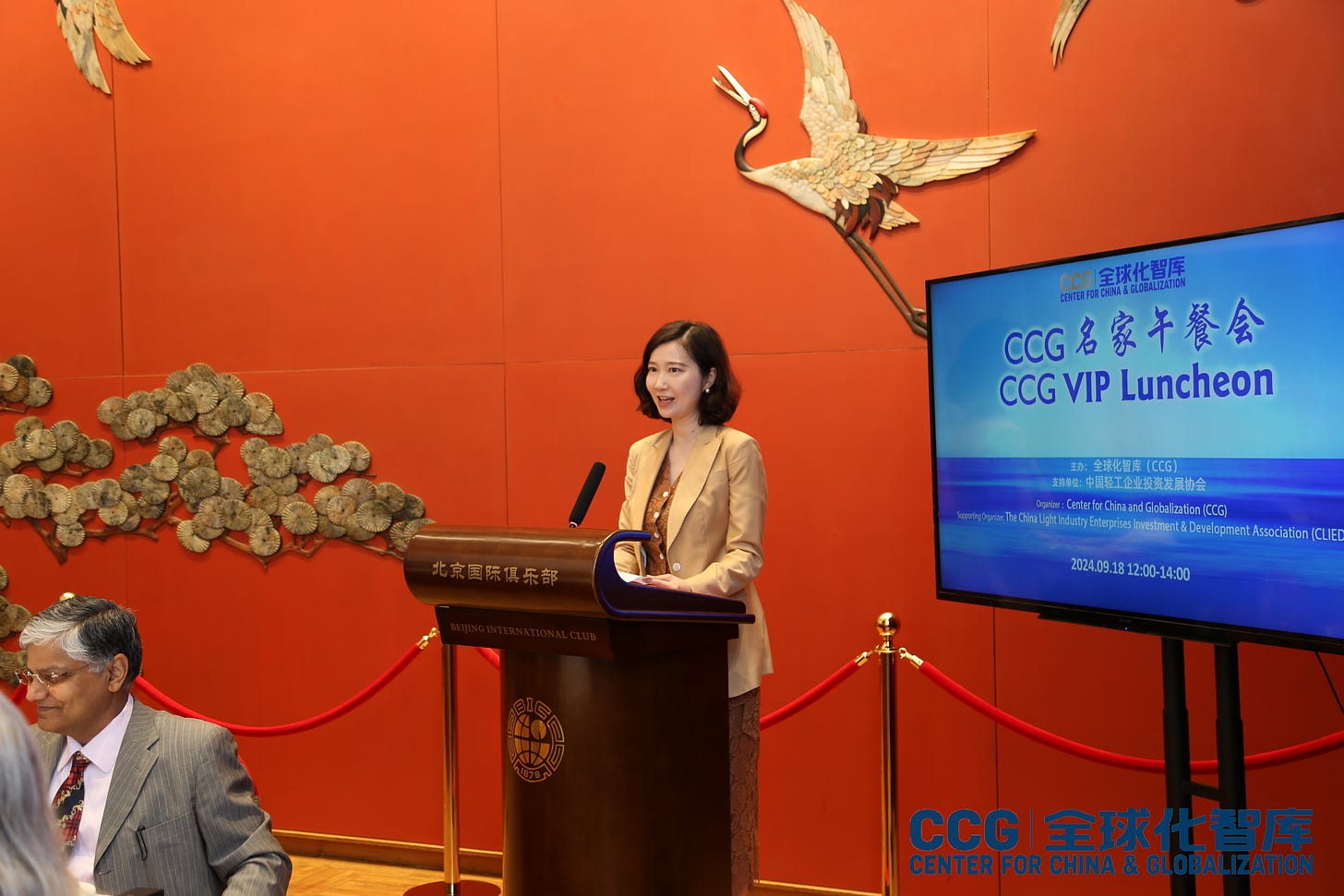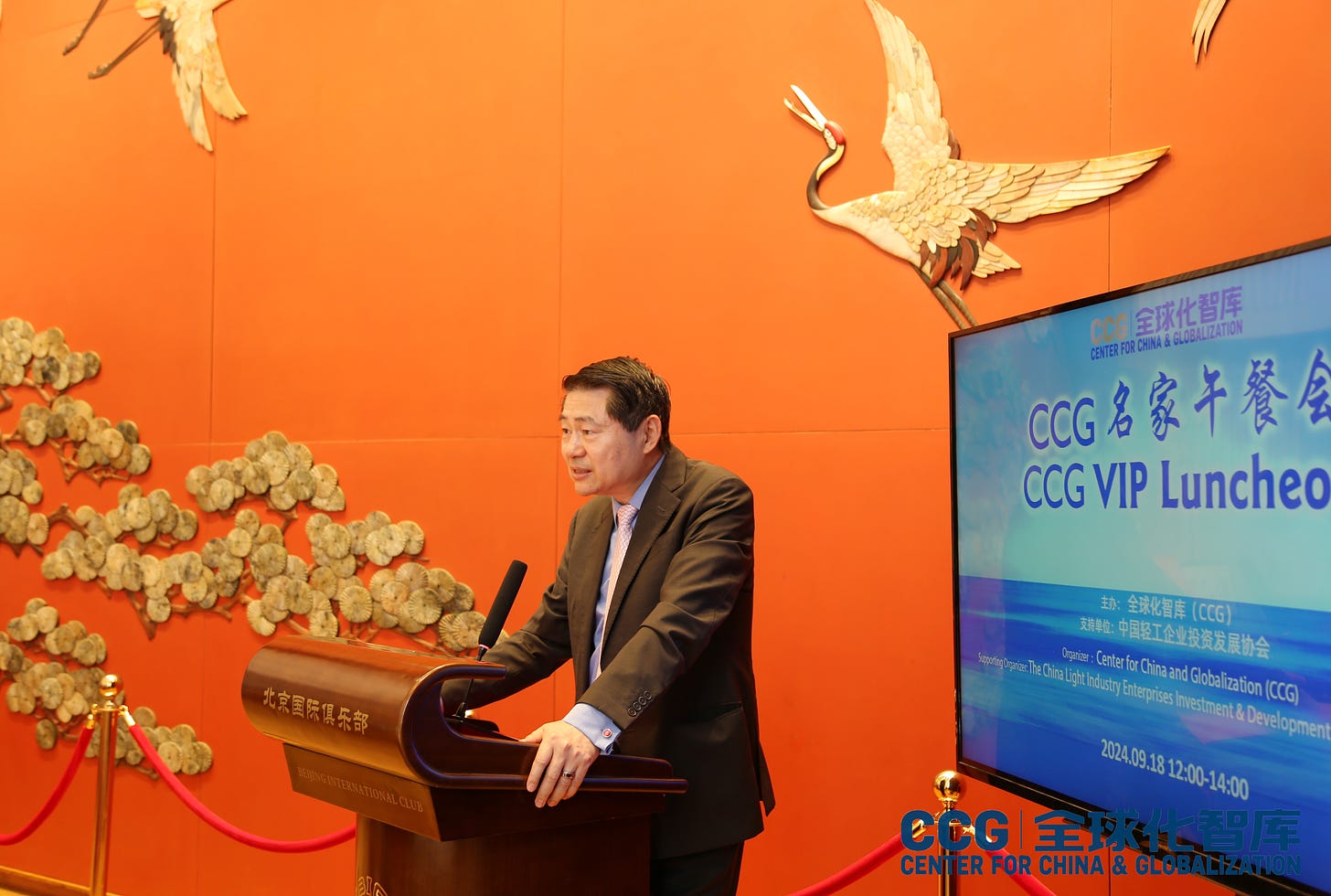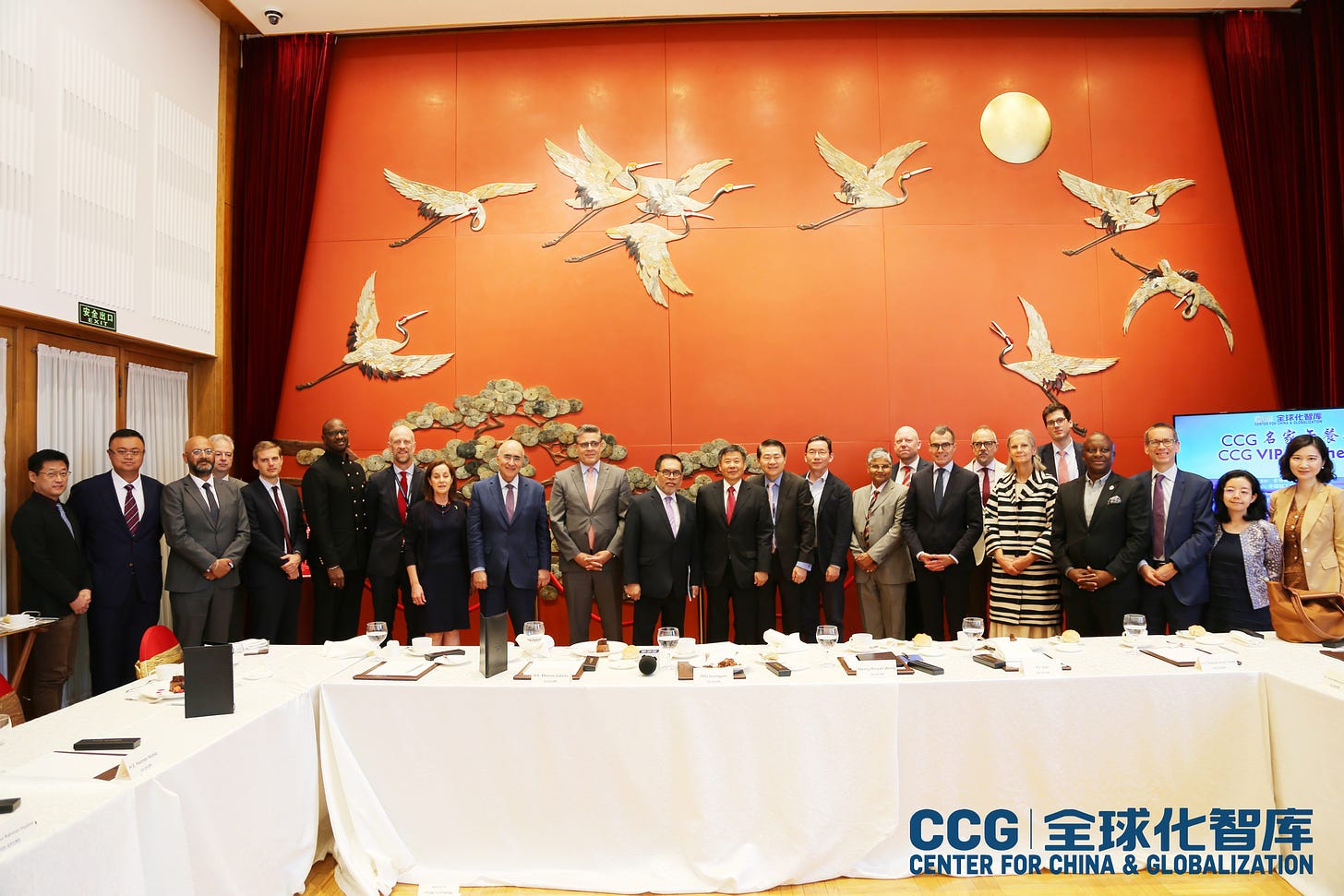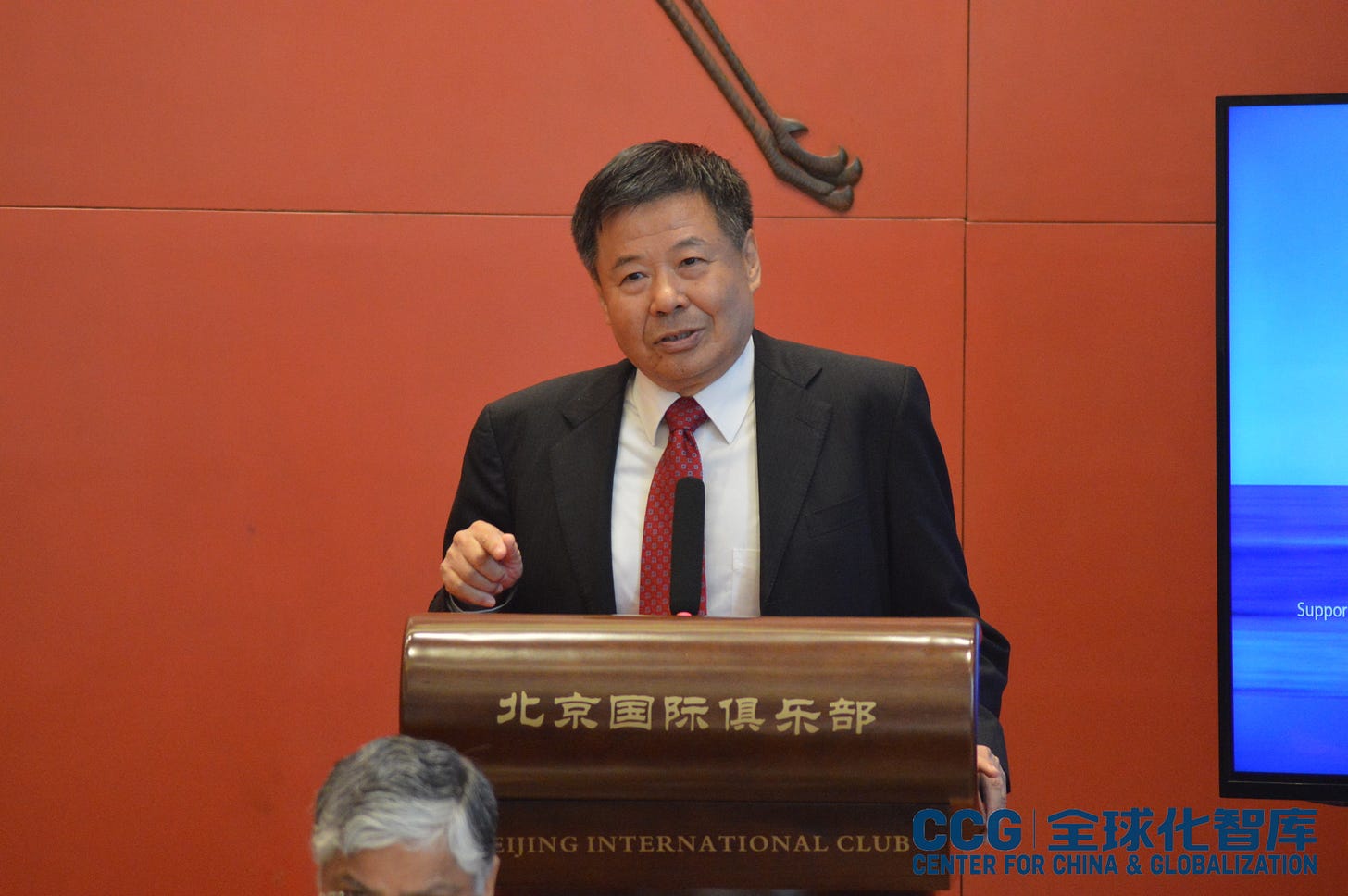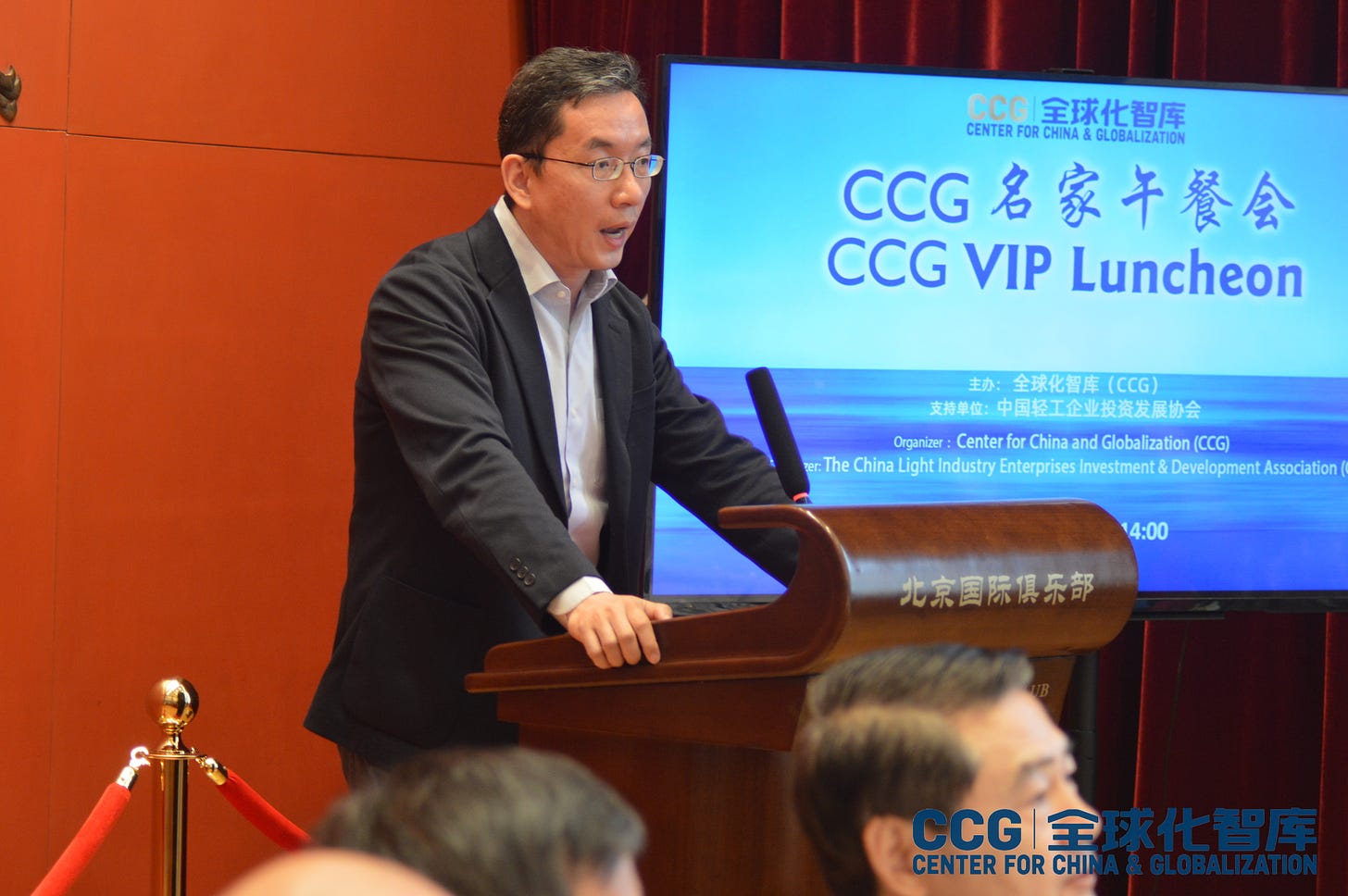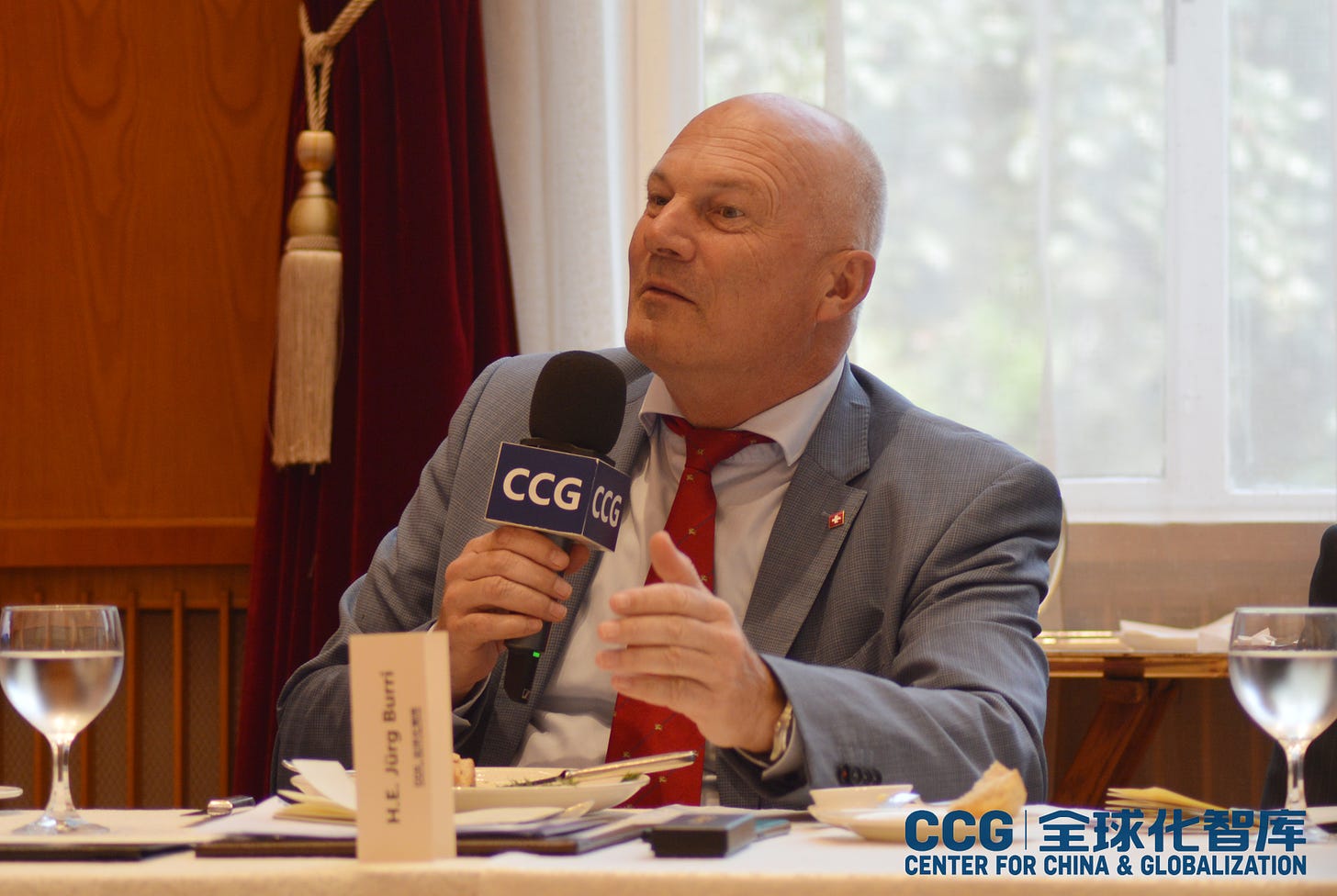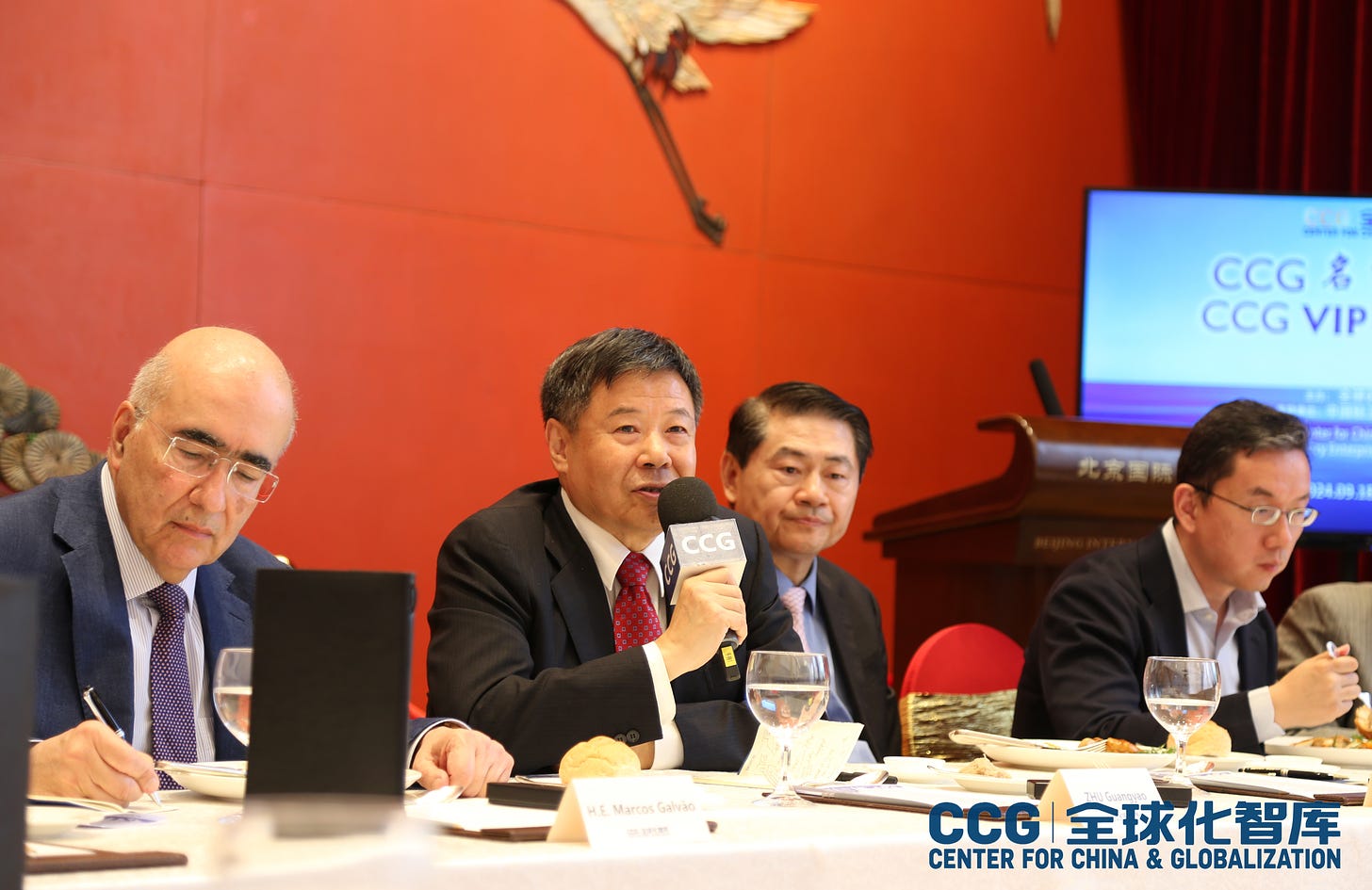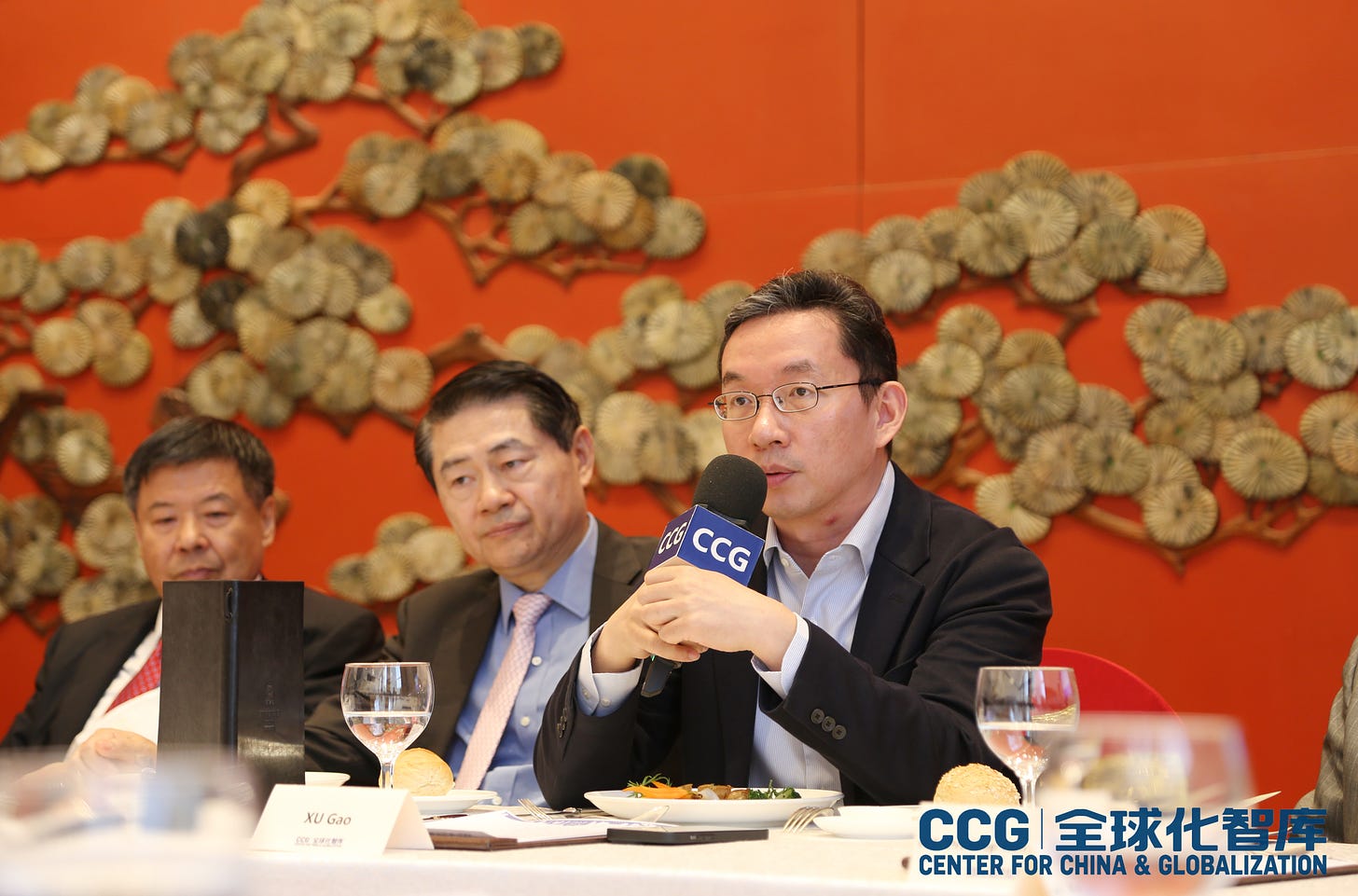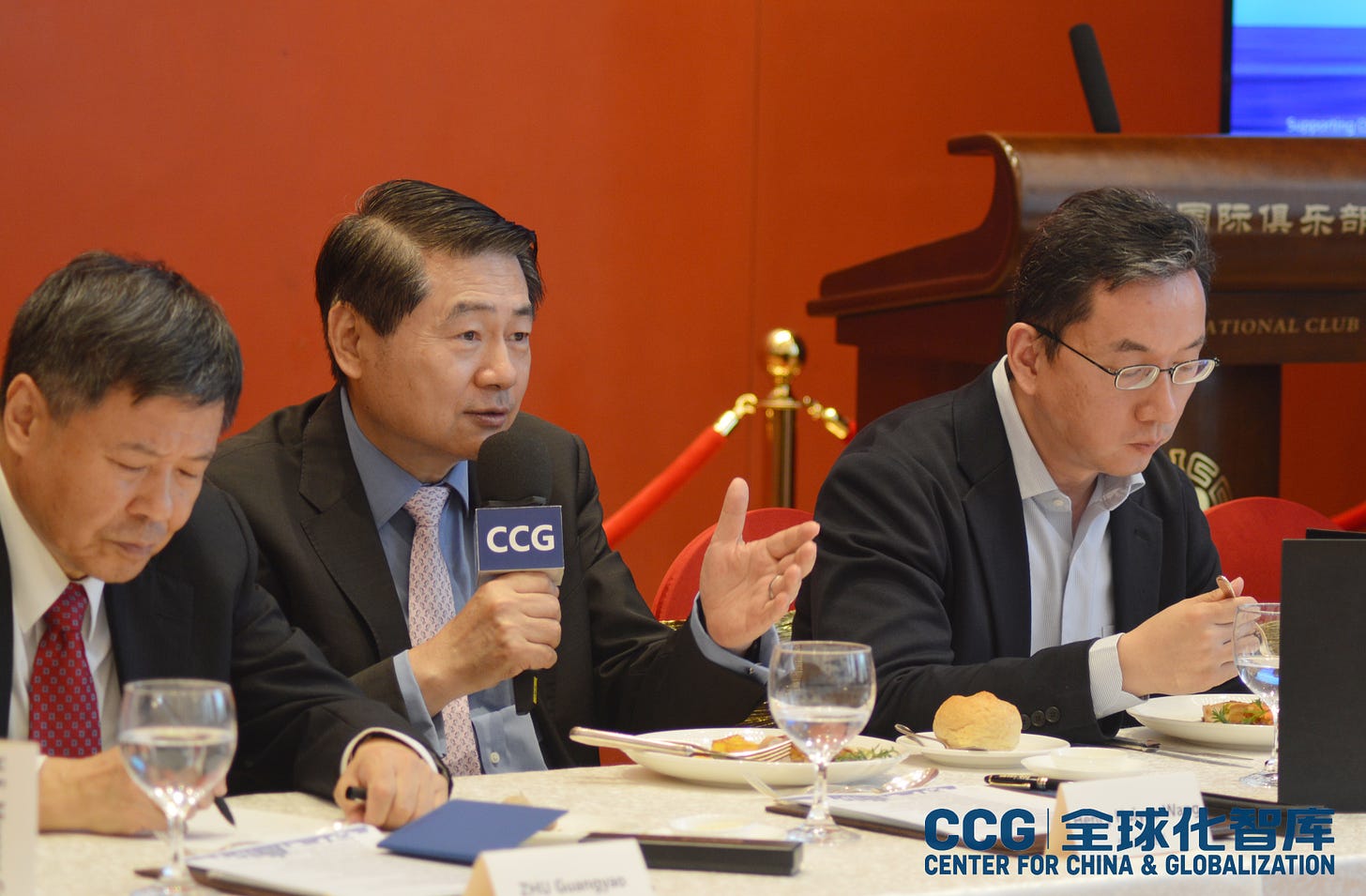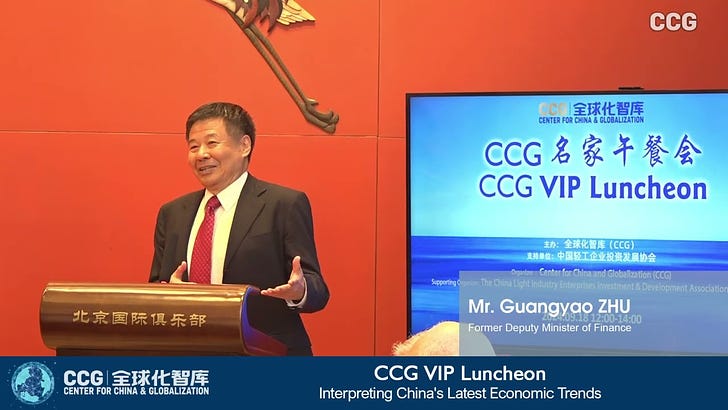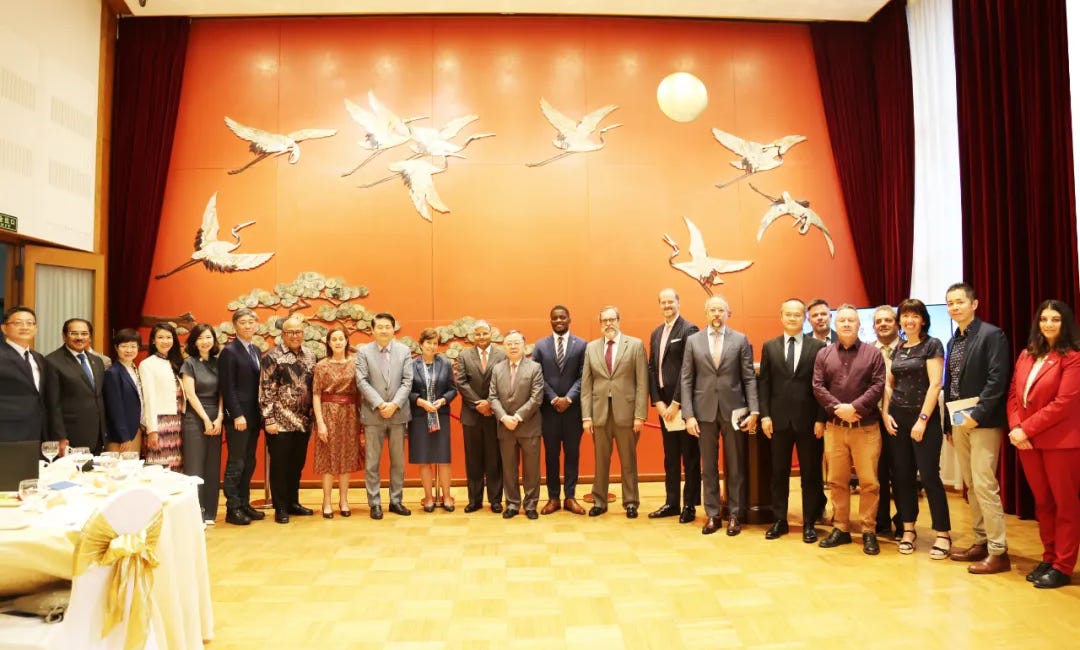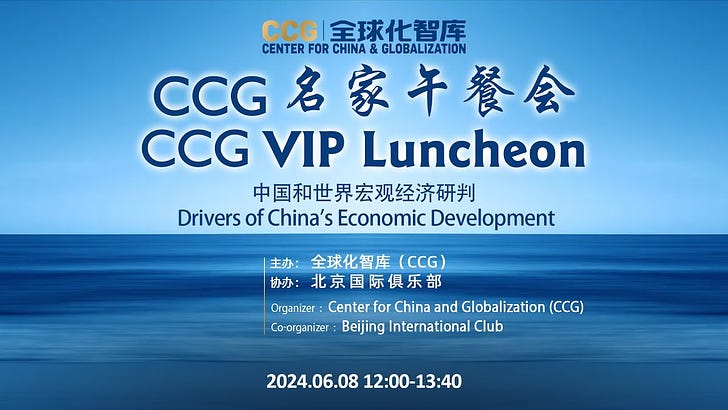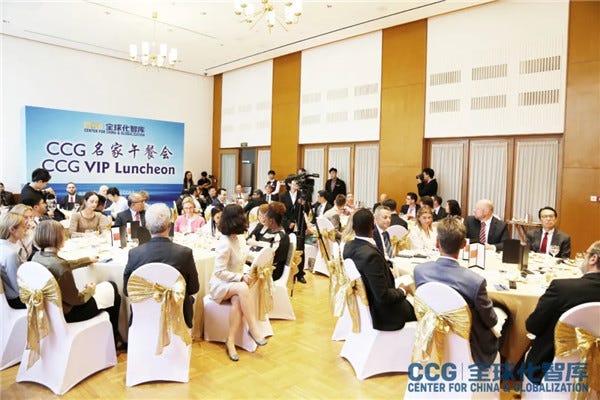Transcript 1/2 of Zhu Guangyao & Xu Gao
Former Vice Minister of Finance and Chief Economist of Bank of China International join CCG VIP luncheon.
The fourth CCG VIP Luncheon was held last Wednesday, September 18, in the historic Xianhe Hall of the Beijing International Club, featuring Zhu Guangyao, Former Vice Minister of Finance, and Xu Gao, Chief Economist of the Bank of China International (China) Co., Ltd.
CCG has broadcast the video recording of the event on Chinese online platforms, where it remains accessible. The video recording has also been uploaded to YouTube.
Moderated by Mabel Lu Miao, Secretary-General of CCG
and Henry Huiyao Wang, President of CCG,
the VIP Luncheon was attended by diplomats in Beijing (alphabetic order):
Irit Ben Abba, Ambassador of Israel
Andreas Brandgaard, First Secretary, Economic Affairs, Embassy of Denmark
Jean-Christian Brillant, Minister (Commercial) of Embassy of Canada to China
Jürg Burri, Ambassador of Switzerland to China
Vebjørn Dysvik, Ambassador of Norway to China
Arna Ferreira, Deputy Head of the Mission, Embassy of Croatia
Marcos Galvão, Ambassador of Brazil
Hannes Hanso, Ambassador of Estonia to China
Khalil ur Rahman Hashmi, Ambassador of Pakistan to China
Hussam AI Husseini, Ambassador of Jordan to China
Haruna Ishida, Economic Counselor, Embassy of Japan
Pradeep Kumar Rawat, Ambassador of India to China
Marta Betanzos Roig, Ambassador of Spain to China
Frances Galatia Lanitou Williams, Ambassador of Cyprus to China
Ian J. Marshall, Ambassador of Grenada to China
Grahame Morton, Ambassador of New Zealand
Djauhari Oratmangun, Ambassador of Indonesia to China
Atakan Ozdemir, Chief Commercial Counsellor of Embassy of the Republic of Türkiye
Adam Pickford, Counsellor on Economics & Trade Policy, British Embassy in Beijing
Roland Reiland, Ambassador of Luxemburg to China
representatives from international organizations and associations (alphabetic order):
Tamas Hajba, Senior Advisor for China, Head of the OECD Beijing Office
Stephen Kargbo, China Representative of United Nations Industrial Development Organization (UNIDO) Field Office
LI Yi, Deputy Secretary-General, China Light Industry Enterprises Investment And Development Association
Martin Taylor, WHO Representative to China
and international journalists (alphabetic order):
Evelyn Grace Cheng, Senior Correspondent, CNBC
Sabine Gusbeth, China Correspondent, Handelsblatt
Dake Kang, China Correspondent, Associated Press
Beulchan Lee, Beijing Bureau Chief, Chosun Ilbo
James Mayger, Senior Reporter, Bloomberg News
KJM Varma, China Correspondent, Press Trust of India
Due to space limits, this transcript includes only the first half of the event, covering the presentations by the two speakers and the first round of live Q&A. The transcript is based on the video recording and has not been reviewed by the speakers.
For more insights from these two experts, check out Minister Zhu's feature on The East is Read, and Xu Gao's latest translated work on Pekingnology.
Zhu Guangyao, Former Vice Minister of Finance
Your Excellencies, ladies and gentlemen, it is my great honor to join this lunch meeting. I'm glad to see my old friend, the Brazilian ambassador. He is my longtime friend. We have many years of cooperation but also many debates. On something he is certainly right. We see our history.
Now I'm very happy to report to you about my learning experience about the third plenary document of the 20th CPC Central Committee. I know you're all very important people who understand international affairs and many of you are familiar with the economic situation. I understand you hate to learn something like education. So without a draft, I would like to report to you about my learning experience about the third plenary document.
My understanding has two key points. One, the document is very important for China, particularly for Chinese economic development. Second, it is very important for the whole world.
Why? Because China today is the second largest economy. In 2023, the Chinese economy is 17.66 trillion U.S. dollars. How much is the U.S.? The U.S. economy is 27.36 trillion U.S. dollars. We see there is still a gap between China and the U.S. However, China certainly has been in fast development since the opening up policy was adopted in 1978. At that time, the Chinese economy's total amount was just 150 billion U.S. dollars; now it is 17.66 trillion. That's a big amount and a big development.
However, we understand that there are still many challenges ahead. To face these challenges, including now this local government debt issue, real estate market stabilization issue, and small-and-medium-sized financial enterprise issue, we must insist on development. Development is the hard truth—that's our experience from the long-time reform and opening up policy.
The third plenary meeting set three very clear important points:
Five years from now, to 2029, all tasks set out by the plenary meeting must be completed. That includes more than 300 tasks for the reform and opening up policy.
2035 is a very important year for China. According to the goal set out by the Chinese Communist Party, that year, China will basically realize economic modernization. What's the standard? There are two key points. One is the total GDP should be doubled from (the level of) 2020. That's a fifteen-year goal. The Chinese economy will double from 100 trillion RMB in 2020 to 200 trillion RMB by 2035. And the per capita GDP should be doubled, too, from 10,000 U.S. dollars to 20,000 U.S. dollars. That's our goal. That's very challenging. We must realize this goal.
With 15 years to double China's economic amount, that means from 2020 to 2035, every year, China's economic growth should be 4.7%. Now nearly five years past, we can see that in 2021, China's economic growth is 8.1%, 2022 is 3%, and last year is 5.2%. This year, our goal is 5%. With four years' average, that's 5.4%. The 14th Five-Year Plan (2021–2025) period will be finished next year. After that, we should have an annual average growth of about 4.3%. With this growth, we can reach the goal set out by the plenary meeting.
The challenge is very huge. We must insist on structural reform and the opening up policy.
If we reach the 2035 goal, that will be a big foundation made for 2050, that is, when the People's Republic of China has been established for 100 years, China will become a modernized socialist country. We have that confidence. We know how big the challenge is.
This is my first point, why this plenary meeting is so important for China. My second point is why this plenary meeting is so important for the whole world. I think the most fundamental, important point this meeting reiterated is that China will insist on the opening up policy. Opening to the outside world is China's basic national policy. This is very important for China, and also important for the world.
We recognize now globally, we face many challenges, including protectionism, which we must work together to deal with. However, we understand that there are some difficult jobs ahead. If the global economic production line and supply chain are separated, that's a big loss for the global economy.
Everybody knows that in 2023, the global GDP is 105 trillion U.S. dollars, and global goods transactions are 48 trillion U.S. dollars. Global service transaction amounts to 15 trillion U.S. dollars. Goods plus services total is 63 trillion U.S. dollars. Both China and the U.S. are very important. Each country's total amount of goods and services is about 6.86 trillion U.S. dollars, basically the same as China's goods transaction is larger than the U.S., but the U.S. is larger in the transaction of service. So if plus goods and services together, both China and the U.S. are basically the same.
The China-U.S. relations are so important. Last year, the total amount of China-U.S. trade was 664 trillion U.S. dollars, but the warning signal is that the figure is down by about 11%. Why? I think that's a problem between China and the U.S.
Firstly, largely from a global perspective, what will be the negative impact if there are two supply chains and two production chains? According to the International Monetary Fund (IMF), the global loss will be 7% to 12% (of GDP), meaning 7 trillion to 12 trillion U.S. dollar loss. That's a warning to global cooperation. Particularly, major economies must be back on the right track to understand each other through communication and negotiation.
Just before lunch, I talked with the Indian ambassador about Chinese development since opening up and reform. A very key experience for China is the development of infrastructure, and at that time the bottom of Chinese economic development was energy and transportation. We had big development.
However, now we are in a digital economy. We are in a new time and two new infrastructures, data center and cable connection, particularly submarine optical cable that connects different countenance, are so important. According to UN figures, more than 99% of data flowing through the different continents is through the submarine optical cable. But unfortunately, the U.S. 2020 Clean Network program made some difference. I really worry about if that disconnection will have a very negative impact on the global economy, particularly in the time of the digital economy. Also according to the UN figure, 49% of data transactions are in Northern America, 24% of data transactions are in Europe, and 20% of data transactions are in East Asia; in China, it's 9%. If disconnected, the U.S. will lose 12% from 49% to 37%, and China will lose 2% from 9% to 7%. These are UN figures, and you can check them. That reminds us that in the digital time how important it is that the whole world, countries, and particularly major economies, work together.
One thing I worry about is the recent WTO negotiation. Yes, there is progress made in e-commerce. But finally, the U.S. didn't join the signing of the document because of some concerns. Last October, the U.S. withdrew a long-term policy request for free data border-crossing and no local storage of data policy. This is a changed policy. We must work together to discuss the new situation, to deal with the new challenge. Although there are many differences, we understand we have common goals, including environmental protection. We must work together.
So I know I spoke too much. I stop here. I would like to answer questions and I understand there is much discussion needed, particularly in today's situation. Thank you very much.
Xu Gao, Chief Economist of Bank of China International (China) Co., Ltd.
Thank you, President Wang. I'm very honored to be here to share my views about the Chinese economy with you. Because I work for a securities house, I will bring some perspectives from the market.
I will briefly talk about three things. One is the current developments of the Chinese economy, especially this year. The second is China's debt situation. The third is the Sino-U.S. relationship.
Come to the first, I think we all know that the Chinese economy is under heavy downward pressures this year, and I believe some decisive demand-side stimulus packages are needed to put the Chinese economy back on track. In the third quarter of this year, China's GDP growth has fallen to 4.7%, which is lower than the 5% GDP target set for this year. According to the current developments in the third quarter, we believe that it's very likely that the GDP growth in the second half of this year will also be lower than 5%. So there's a good chance that China will miss the 5% growth target this year, but not that much. The market consensus for GDP growth this year is 4.8%. It's still around 5%, but lower than 5%.
If you look at the economic indicator, actually, the elephant in the room is definitely the property market because if you look at external demand, China has done a very good job in exporting in the first several months of the year. The export growth in the first half of the year beat market consensus. If you look at the inside, everybody knows that China's consumption growth is not that strong, but that is, I think, a natural outcome because consumption is mainly determined by household income and the household prospects for future income. So if the economy is in a downward trend, I think it's natural for consumption to be weak.
But if you look at the investment, actually, China's investment is mainly made up of three main parts, manufacturing investment, infrastructure investment, and property investment. These three combined account for about 80% of China's total fixed asset investment (FAI). And in the first half of this year, the growth of manufacturing investment and infrastructure investment was not that bad. The growth rate is higher than the average growth before the pandemic.
But in the meantime, we see the property market continue to contract. Property investment declined by about 10% in the first half of this year. That is why China is facing this huge downward pressure. I think the downward pressure of the property market is mainly a result of the credit crunch towards the property market. Actually, since the year 2021, total funding flowing to the property market, especially flowing to the property developers has been halved. I think for any sector, if you half its funding, naturally, it will have some problems. That credit crunch has taken a toll on China's property market.
So the basic conclusion is that the housing demand of the Chinese people is still there, but they just dare not buy houses, especially new houses, because they're afraid of the credit risk of the property developers, and they're afraid that their houses cannot be delivered because there's a good chance that some of the property developers will go bankrupt.
So if we can curb the credit risk in the property market, I think we can restore the confidence of potential house buyers and restore the market transaction in the property market. In order to do that, now the property market is in a kind of market failure, which means that if you do not give some external force, the market cannot go back to its normal situation.
So I think some kind of stimulus package, especially fiscal stimulus packages needed to restore confidence, not only in the property market but also in the whole economy. I believe as China continues to face heavy downward pressures, I think that kind of stimulus policies will be more likely in the coming quarters. That's the first point I want to make.
Then I will talk about China's debt situation. I don't say "debt problem" or "debt crisis" because I think the Chinese debt situation does not necessarily lead to a problem, not to mention a crisis. If you look at the data compiled by the Bank for International Settlements, China's overall debt-to-GDP ratio has reached 280%. That is higher than the average of developed countries, not to mention emerging markets. And if you look at the trend, China's upper trend is very clear and is likely to continue.
So if you have so much debt, I think it's natural for people to worry about a possible debt crisis. And that's why Chinese policymakers have implemented some of the deleveraging policies in recent years. But I think we cannot jump to the conclusion that fast.
It is true that China has a very huge domestic debt, higher than the average level of the advanced economies. But don't worry, China's savings rate is much higher than the rest of the world. China's savings rate is about 44%. That is about two times the international average. As China's financial market is also dominated by debt instruments, China's total social financing, an indicator compiled by the People's Bank of China (PBoC) that measures all the funding flow from the financial market to the real economy, about 70% of China's total social financing is made up of bank lending, and another 30% of the total social financing is made up of bond financing, which means over 95% of China's total social financing is debt instruments.
If you have a savings rate of over 40%, and you translate 40% of your GDP into investment through this debt-instrument-dominated financial structure, it is inevitable that you will have a higher debt ratio. So the higher debt ratio of China is a result of China's very high savings rate. I don't have time to explain why China has so much savings, but I think the conclusion is clear: in the foreseeable future, China will continue to have a very high savings rate. So I think it makes a lot of sense for China to have more debt.
Another thing is, if you evaluate the potential threat of a debt crisis of a country, the domestic debt level is not that important. The tight debt constraint for a country is its external debt, not its domestic debt. So if you look at China's balance of payments, we have had a balance of payments surplus for many years. And if you look at the international investment position, China now has net foreign assets amounting to 2.9 trillion U.S. dollars. That's the foreign assets owned by China minus China's foreign liability—2.9 trillion U.S. dollars. So if you think that China has accumulated too much debt within its economy, don't forget that China has lent 2.9 trillion U.S. dollars to the rest of the world.
So I don't think a debt crisis is something we should worry about. Of course, we we should have some structural policies to have more reasonable leveraging, which means that we should put debt to more productive fronts. But for the Chinese economy as a whole, I think it makes a lot of sense for China to have more debt. If you implement deleveraging policies too harshly, you'll have the problem we're facing now.
The third point I want to make is about the U.S.-China relationship. We all know that there is some kind of trade friction between the U.S. and China. I think that is just a footnote to the long-lasting debate about the global imbalances, especially between the U.S. and China, that has been lasting for 20 years. We have this symmetric external imbalance between the U.S. and China: China has a lot of current account surplus, and the U.S. has a lot of current account deficits.
But there's an old Chinese saying that it takes two hands to make a clap. We always blame China, that China should rebalance its economy from this investment-driven model to a consumption-driven model. I think that is true; China should rebalance its economy. But in the meantime, the United States should also rebalance its economy to a more production-driven growth model. And if you look at the U.S. current account surplus, in the last 20 years, from 2001 to 2023, the total U.S. current account deficit amounts to 12 trillion U.S. dollars. So the U.S. as a whole benefited a lot from globalization.
But the problem is, that the U.S. cannot distribute the profit it got from globalization evenly within its economy, so we see this widening income gap within the United States. The rich guys in the United States benefited a lot from globalization, but in the meantime, some people, like the redneck, these ordinary workers, suffered a lot. There's another old saying in China, external factors play a role through internal factors. So if the United States had a better income distribution and distributed its globalization dividend more evenly within its economy, I don't think the United States will have had the problem it has in recent years.
So I think it is true that China should rebalance its economy and that Chinese policymakers have done a lot to do that, but it takes time. I think the high-savings growth model of China is mainly a result of China's income distribution too, which means if you want to rebalance China to a consumption-driven model, you should increase China's household income as a share of China's GDP. Chinese policymakers have done a lot to do that, but it takes time.
In the meantime, the United States should also acknowledge that they have something wrong within its economy and do something, especially on the income distribution to fix its problem. If the United States and China can do that, I think we will have a more balanced and more sustainable U.S.-China relationship in the future.
I will stop here, and I'll be happy to take questions. Thank you.
Q&A
Irit BEN ABBA , Ambassador of Israel
Thank you for the interesting introductions. I'd like to ask: you spoke about the growth of the Chinese economy, and as we all know, the Chinese economy generates its major growth from exports, which last month grew by 8.7%. I think it's quite dramatic. Now, on the other hand, we see a lot of countries around the world keep having all these tariffs, starting from the U.S. and even to Indonesia. How does China seize the next few years when the world is slowly drifting away from globalization, there are a lot of tariffs that are affecting everyone, and Trump, and sanctions, etc? How is China thinking of its growth in the next couple of years when there's such a big problem with open trade and globalization?
Roland REILAND, Ambassador of Luxemburg to China
Thank you so much. My name is Rol Reiland. I'm the Ambassador of Luxemburg. For me, it's the second time to be posted in China. I was here a couple of years ago as a deputy head of mission. Now I've been back for a year. So I've been watching China for a while. Thank you, first of all, for the kind invitation. Thank you for the interesting speeches, which I think are framing the discussion. First of all, Minister Zhu, you gave us a little bit of a framework of the goals. Secondly, Professor Xu, you gave us a little bit of where we stand now in terms of imbalances.
So my question would be referring to the next Five-Year Plan, the 15th Five-Year Plan, and drawing a little bit also what my colleague, Ambassador Ben Abba just mentioned: What should be the priorities for the Chinese economy in the next Five-Year Plan? Would it be going on so the graduation, from a view of development economist, trying to overcome this middle-income trap and moving to a high-end economy (as) what we have seen now in the last priorities? Building up on that, will that generate enough growth to attain the targets that you mentioned, Minister Zhu?
Secondly, Professor Xu, what should be the priorities in the next Five-Year Plan to deal with the imbalances? So the high savings rate, how to go about that, and what should be the priorities? I think you made an interesting link here between the high savings rate and the debt situation. So how to address these imbalances in the next Five-Year Plan? Thank you very much.
Jürg BURRI, Ambassador of Switzerland to China
First, Minister Zhu and Professor Xu, many thanks for your most interesting assessment. You gave us lots of background, figures, and perspectives on the three most often mentioned economic issues that we closely observe here in China, which are the trade part, the real estate part, and the consumption part.
The real estate part is a really big thing. I think everybody is very concerned about it, and it was really good to hear you and your insights about it. In the trade part, Switzerland is one of these countries that has actually waved tariffs because we want to demonstrate that we are free traders. But we all know that this is not a trade issue, this is a political issue. We just call upon all parties to figure that out because it serves best if we are free traders, if all are free traders.
The third issue, the consumption issue, you have to have me on that. I've been observing China, and I am in the lucky position that we not only deal with savings and with banks, but we also deal with consumptions, for example, Nestlé or watchmakers. What I hear is that there is a big cultural effect in China, for example, fewer watches are sold in cheaper boxes. And when I go to a good hotel, like the St. Regis, I notice that the hotel is sometimes full and the restaurant is empty because street food outside is booming. I can bring more examples, of course. Do you have a perspective on whether the Chinese really are consuming less in the sense of fewer transactions? Or are the Chinese just becoming more not fascinated by the glory of the expensive Western products, but quality-driven, which would be the number of transactions the same, turnover lower, and therefore consumption lower? Thank you.
Zhu Guangyao
The situation in China, particularly in the next five years, is very crucial. Domestically and internationally, we are now facing a very complicated situation.
For the trade issue, I still want to emphasize services because last year, the total global goods transactions in U.S. dollar terms fell by 5%. However, the service trade increased by 9%. That reflects the changed situation in digital economic development. If you ask what is the driving (factor) for the next five years, I will answer innovation, particularly digital economic development. China now is at 43.3% digitalization for the whole industry, and less real amount is 7.5 trillion U.S. dollars. We are the second-largest digital economy. However, we understand that 43.3% is largely behind the U.S., Germany, and the UK, who are all more than 60%. So innovation is the way to promote digitalization in China. We really hope that it will greatly enhance productivity and increase the contribution of technology to real production.
The 15th Five-Year Plan (2026-2030) is a very crucial time because of the 2035 goal, which is doubling the economy and per capita GDP based on the 2020 figures. For the 15th Five-Year Plan period, China's economic growth should keep at 4.5% to 5% because as I reported to you, only a 4.3% growth average is needed from 2025 to 2035 to reach the goal, but we should give more room to the last 10 years (2025-2035). For the 14th Five-Year Plan period, I wish the 4.5% to 5% growth is necessary, but that figure should be decided by the People's Congress next year. Next year is the last year of the 14th Five-Year Plan period. I think based on the previous four years where we reached an average growth of 5.4%, a growth of 4.5% next year will be able to meet the 2035 goal.
The real economy and digital economy are so important for China, but we must understand how to create some real conditions, particularly local conditions, to develop the digital economy. Now we have a full-scale base on the industry side, enhancing productivity becomes very important. We hope the full sector productivity (growth) can be back to 1.5% to 2%. It's not easy, but the real hope is innovation, is AI development. Now we have a large space for AI practice, and we hope the innovation can contribute to China's economic development faster and with more international cooperation. Particularly, a digitalized society needs that global connection—information connections and people-to-people connections.
That's why I think opening up is important. Even if there are some different opinions, they should be put on the table for discussion. The related issue is the clean energy and EV industry, as the U.S., EU, and Canada give us a very high percentage of tariff up to 100%. I think that damages both the interests of China and also other countries because the environmental goal set by the Paris Agreement, that is 2-degree or most ideally 1.5-degree temperature rise from pre-industrialization levels, needs global efforts. American and EU friends should be thinking about how to realize that goal and how to really put our efforts back on the right track. That's our common goal—to protect the Earth we live in. That's so important.
Xu Gao
Ambassador Reiland's and Ambassador Burri's questions are both consumption-related, so I will answer them together. China's consumption rate is about 56%, which is composed of household consumption and government consumption. In order to rebalance China to a consumption-driven model, what we need is very clear—to increase household consumption. And in order to do that, you should increase household income as a share of China's GDP.
Now the total disposable income of China's household sector to GDP ratio is only 60%. And households always need to have savings. So if you have only 60% of the Chinese GDP as household income, it's very hard for households in China to increase consumption.
I think what we really need to do in the next Five-Year Plan is to adjust China's income distribution between three main sectors of China, that is, the household sector, the property sector, and the government sector, and increase the total disposable income of the household sector to GDP ration. And in order to do that, there are a lot of people now suggesting that the government just give money to the household. That's one way to deal with that. Another way is what I proposed last year, that we channel the returns on state-owned assets to the household sector.
To summarize, to rebalance the Chinese economy, you need to increase household income. That's the key thing we should do. But as I said before, it takes time because you can imagine how hard all the structural reforms needed to rebalance that income distribution will be.
So before we make substantial progress on that front, I think China will, for a long period of time, rely on investment as a main engine to generate demand. If you do not have very strong consumption, and you do not have very strong investment, you will have insufficient demand and long-lasting deflation, just like what China experienced from 1998 to 2002. We had five years of deflation in that period of time.
To boost the country's economy and maintain stable growth in the short term, I think what China should do is adjust its deleveraging policies and do some possible stimulus to boost demand, especially in terms of investment demand.
Back to Ambassador Burri's question about consumption. Now we see there are signs that Chinese people do not consume that much. I think that is more like a cyclical problem. Because you have falling GDP growth, falling household income, and falling expectations for future job security and future income, it is natural for China's consumers to consume less and to do more precautionary savings. There are a lot of people, especially on China's social media, talking about China's consumption downgrading. In the past, they may go to luxury restaurants, but now they just go to the sidewalk food stores to buy some cheap food. So I think if we can simulate the Chinese economy to a more decent level, and especially if we can revitalize Chinese ordinary people's expectations of the future, I think that kind of a cyclical downturn of Chinese consumption will gradually phase out and Chinese people will continue this trend of consumption upgrading in the last several decades. So the consumption downgrading is more like a cyclical problem.
Henry Huiyao Wang, President of the Center for China and Globalization (CCG)
I'd like to add something as well. I think China is really in a recovery period. Remember, we are just getting off the three years of COVID lockdown, which is a very heavy hit on the Chinese economy. Now we're seeing a recovery. For example, tourism is recovering. For example, during the Chinese Mid-Autumn Festival this year, domestic traffic has come up 37%. It's enormous. And of course, we see that international tourists are coming back. We have opened the visa-free policy for 15 European countries. I'd like to see 27 EU countries and even more. 59 countries can go to Thailand for one month. Maybe we should apply visa-free travel to as many countries as that.
The EVs, solar panels, and all those new technologies are booming. That offsets a bit of the real estate downturn. But again, I think 70% of Chinese citizens' wealth is in real estate. So if the real estate is coming down, everybody is holding their wallet tight to their chest and not spending anymore. I think that probably will take a few years to recover.
One of my suggestions I made is that we should let 300 million migrant workers sell their household land so as to stimulate domestic urban consumption.
I see every 10 years, China always has a breakthrough. For example, in the 80s, there was the contracted land system, where farmers could grow whatever they liked. That changed the Chinese economy from one of shortage to one of abundance. In the 90s, the Chinese government allocated all the flats to urban residents for free. That created 400 million middle-class people. In the 2000s, China joined the WTO. There used to be a handful of SOEs doing foreign trade, now six million Chinese companies are doing foreign trade. China became the largest trading nation in the world. Now we're waiting for some breakthrough policies like 300 million migrant workers allowed to trade in their household land for urban residency.
Check out transcripts of previous VIP luncheons:





